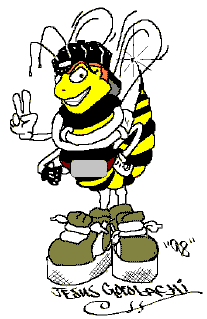NATIVE AMERICAN SUMMER INSITUTE 1999
"BEEPOP"

The Institute conducted a six week program at the University of Arizona for the summer of 1999. The first three weeks were administered by the Department of English through the Southern Arizona Writing Project. The final three weeks were administered by the Department of Mathematics through the Southwest Regional Institute in the Mathematical Sciences. The Institute had 21 participants from the Tohono O'odham Nation and the Pascua Yaqui Tribe.
The National Science Foundation through the Southwest Regional Institute of the Mathematical Sciences (SWRIMS) and the Howard Hughes Medical Institute through the Undergraduate Biology Research Program (UBRP)provided funding for the math/science program for the summer of 1999. We would like to thank the funding agencies, SWRIMS director William Yslas Velez and UBRP director Carol Bender for their support of the Institute.
Leesa Johnson coordinated the morning activities at the Institute. Leesa, a former high school teacher on the Navajo Reservation, is a graduate student in the American Indian Studies program. She designed a program of mathematics education for the participants to improve their algebra and problem solving skills. The students also learned how to use a spreadsheet.
For the first week, the afternoons were be devoted to BeePop: The Population Dynamics of Honey Bees in the Hive and in the Wild. These class notes take an in depth view of the nature of mathematical modeling. These notes, an educational perspective of the original research at the Bee Research Center.
BeePop is a set of exercises and projects designed so that the participants will use mathematics to learn about the biology of honeybees, the dynamics of the hive, and the mechanisms for colony migration. Joe Watkins, the author of BeePop, coordinated these activities.
During the second week, the afternoons will be devoted to the Economics of Beekeeping. The Economics of Beekeeping activities have the students using their spreadsheet skills to learn basic principles of economics and to use these principles to design a business strategy for a beekeeping operation. The students also use BK-Economics, a software package, designed by a team of scientists at the Carl Hayden Bee Research Center to assist commercial beekeepers in streamlining their business practices. This software allows the students to simulate years of business, taking into account factors like equipment purchases, labor force, transportation, marketing strategies, loans, honey flow, and other hive products without taking the usual risks.
Kate McGivney designed and coordinated BK-Economics. Her course is on-line
Joe Watkins is an associate professor and Kate McGivney is a teaching postdoctoral fellow in the Mathematics Department.
Our tutors this summer were Damon Corella and Tanya Sproule. Daman, a recent graduate from Ha:san, a charter school for the Native American communities, is Tohono O'odham. Tanya, an accounting major at the University of Arizona, is Pascua Yaqui.
The Institute operates Wa:k Apiary on land generously provided to us by the San Xavier Farming Cooperative. This apiary, the only apiary on tribal land run be tribal people, is one-half mile southeast of San Xavier del Bac Mission in the San Xavier District of the Tohono O'odham Reservation. Clifford Pablo is the president and Julie Ramon Pearson is the vice-president of the Farm Coop. Eric Erickson, the director and Gloria DeGrandi-Hoffman, the senior entomologist at the bee center, have been training students at the Wa:k Apiary throughout the year in beekeeping.
On the third week, the participants continued to work with Leesa on their math skills. In addition, the Institute conducted a series of special projects. Some participants worked with Kate and Tanya on the economic plan for the apiary, some worked with Joe and Damon to develop the Institute's website.
The students also took a variety of field trips - to the Bee Center, to the Tree Ring Lab, to the Mirror Lab, and to the Lunar and Planetary Sciences Lab. UBRP coordinated a variety of biology lab visits. Students also had the opportunity to learn about New Start, a summer program to prepare students entering their freshmen year, and to visit the Native American Resource Center.
The Institute conducted two special field trips this summer. On Monday, June 21st, we traveled to the apiary to conduct our first honey harvest. On Wednesday, June 23rd, we visited the bee center to begin extracting honey.
Although the day to day activities of the Summer Institute have come
to a close, activities of the Institute will continue. One team will
be extracting and bottling honey, a second will be working on the logo
and marketing strategy. We also have some work left to do on the website.
At this moment, the leading candidate for the product title is
Native Sweetness: Honey from Tucson's Desert. We plan to have a bottle ready
for you soon.